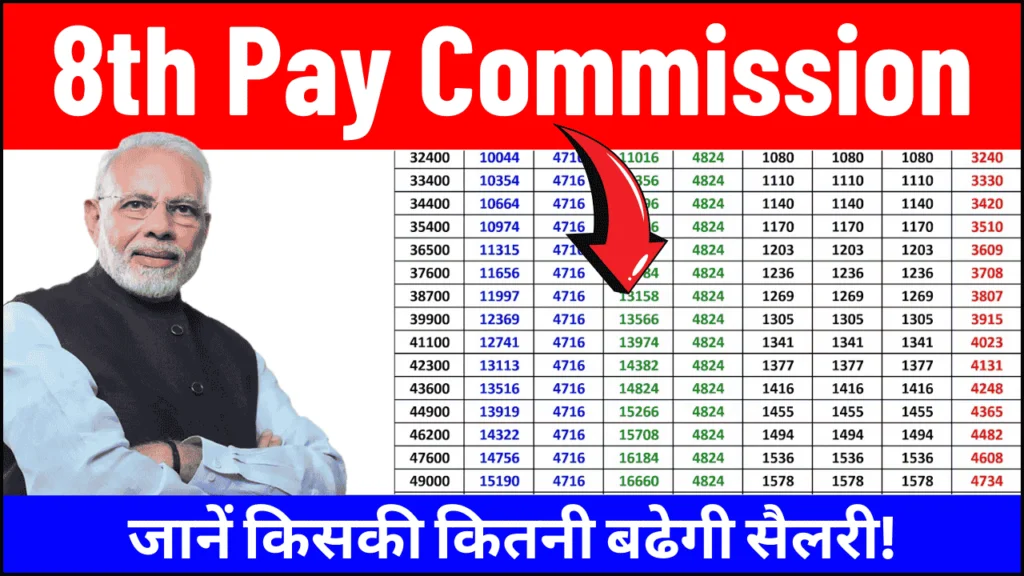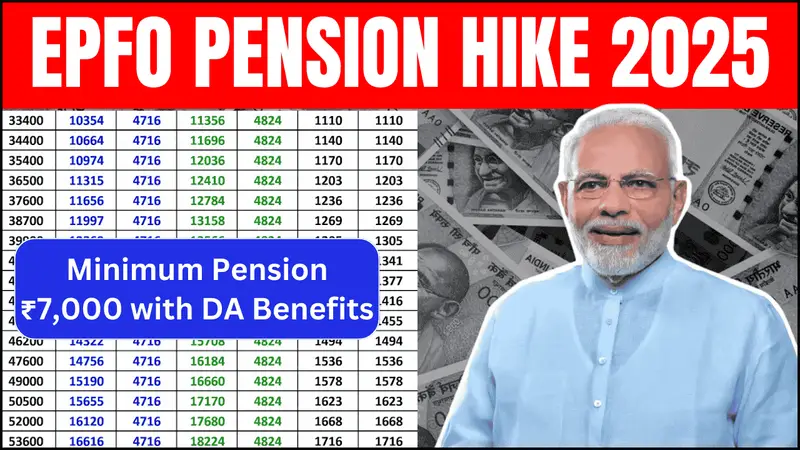
The wait is on. Central government employees and pensioners across India are buzzing with anticipation as talks around the 8th Pay Commission gather momentum. With expectations riding high for salary revisions, better benefits, and pension enhancements, the upcoming recommendations could significantly reshape the financial well-being of lakhs of individuals employed in the public sector.
While no official announcement has been made yet, various reports suggest that major updates, including changes to the minimum pay, fitment factor, and allowances, are likely to be on the cards. Here’s everything we know about the 8th Pay Commission and what it could mean for government employees and pensioners in the coming years.
What is the 8th Pay Commission?
The Pay Commission is a central government-appointed body responsible for reviewing and recommending changes to government employees and retirees’ salaries, pensions, and allowances. Since independence, India has set up seven such commissions, with the 8th Pay Commission being the next in line. These commissions ensure that government compensation stays aligned with inflation, economic conditions, and the evolving needs of the workforce.
The last major revision came through the 7th Pay Commission in 2016, which implemented a fitment factor of 2.57 to revise salaries and pensions. Nearly a decade later, the 8th Pay Commission is expected to pick up where the 7th left off—with an even more employee-friendly approach.
When Will the 8th Pay Commission Be Implemented?
As per the current buzz, the 8th Pay Commission’s term will officially begin in January 2026, but the actual implementation of its recommendations may not happen until early 2027. This delay is consistent with previous trends, where the final report needs to go through thorough government review before being passed.
However, there’s a silver lining for employees and pensioners: once implemented, the new salary and pension structure will likely come with arrears for the entire year, backdated to January 2026. That means eligible individuals will receive a lump sum of accumulated dues upon implementation—something many look forward to.
How Much Salary Hike Can You Expect?
Although the final recommendations are still awaited, early estimates suggest that government employees could witness a basic pay hike of 25% to 30%. This change will primarily depend on the fitment factor, which could be revised from 2.57 (7th Pay Commission) to anywhere between 2.6 and 2.85 under the new structure.
Here’s a quick snapshot of what this means:
- The minimum pay could rise significantly, benefiting employees across all levels.
- The salary revisions would translate to higher take-home income, improving disposable income and financial planning.
- This change is especially beneficial for employees in the lower income brackets, as the commission may propose a more inclusive model with fair distribution.
What’s New in the Pay Matrix?
The pay matrix, a simple but structured format introduced in the 7th Pay Commission to replace the previous grade pay system, is likely to get a major facelift. The updated matrix could feature:
- Better alignment between job roles and pay scales
- More transparent salary progression
- A simplified mechanism for increment calculations
This could streamline promotions and career progression while making salary structures more equitable across different departments and job profiles.
Pension Reforms and Senior Citizen Benefits
Retired central government employees are also expected to see some positive changes. The 8th Pay Commission is likely to focus on:
- Revised pension calculations in line with the new fitment factor
- Enhanced post-retirement allowances
- Better access to medical and social benefits for senior citizens
For many retirees, these changes won’t just mean a financial boost—they’ll ensure a more secure and dignified post-service life.
Adjustments for Inflation: Dearness Allowance and More
A core component of government compensation, the Dearness Allowance (DA), is expected to be recalibrated under the 8th Pay Commission. With inflation rates fluctuating, DA plays a key role in protecting the real income of employees.
The central government recently approved a 2% DA hike, pushing the rate to 55% of basic pay. Such incremental changes are typically done biannually, but with the new commission, the structure may become more dynamic.
As DA rises, other linked components like House Rent Allowance (HRA) and Travel Allowance (TA) are also expected to increase. The result? A better financial package that reflects the rising cost of living.
Other Expected Benefits from the 8th Pay Commission
Besides direct salary hikes and pension upgrades, the 8th Pay Commission may introduce several employee-centric changes, including:
1. Better Work-Life Balance
The new structure could promote a more balanced lifestyle, with improved leave policies, flexible working options, and allowances designed to support mental and physical well-being.
2. Focus on Junior-Level Staff
One of the goals might be to narrow the gap between junior and senior-level pay scales. By ensuring higher percentage hikes for lower pay bands, the commission may help create a more inclusive and equitable structure.
3. Boosted Job Satisfaction
With higher take-home pay, better benefits, and a more transparent pay matrix, job satisfaction is likely to increase—potentially boosting morale and productivity across government offices.
The Road Ahead
Although the final recommendations of the 8th Pay Commission are still some time away, the road map is becoming clearer. The commission is expected to submit its interim report by mid-2026, followed by the final report by the end of 2026. Once approved by the Union Cabinet, implementation may begin in early 2027, with a retrospective effect from January 2026.
Yes, the waiting game continues—but for many, it promises to be well worth it.
The Way Forward
The 8th Pay Commission is more than just a salary revision—it’s a comprehensive overhaul aimed at making government service more rewarding, transparent, and financially secure. While delays are expected, the overall direction points to a brighter financial future for India’s central government employees and pensioners.
For now, employees can keep an eye out for interim updates and policy announcements and prepare to welcome a new chapter in their professional journey—one that values their contribution with fairer compensation and improved benefits.

Mangesh Garg is a passionate writer known for captivating stories that blend imagination and reality. Inspired by travel, history, and everyday moments, He crafts narratives that resonate deeply with readers



